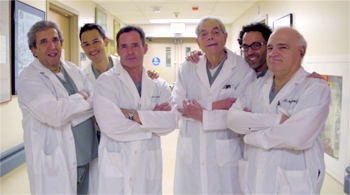St. Michael’s showcases cutting-edge endoscopy at annual event broadcast around the world

By Selma Al-Samarrai

This year’s six course directors are St. Michael’s gastroenterology physicians (from L to R) Paul Kortan, Chris Teshima, Gary May, Norman Marcon, Jeffrey Mosko and Gabor Kandel.
Last month, six St. Michael’s Hospital physicians hosted the 31st International Course on Therapeutic Endoscopy where 14 international physicians performed a total of 50 live endoscopic procedures.
The annual three-day course was broadcast live to approximately 250 local, national and international attendees at the Royal York hotel.
“Our live endoscopy course started in 1983 and has definitely evolved over the decades. Every year, it allows us the opportunity to introduce new technology, new devices and to also reinforce standards of practice in the field,” explained Dr. Gary May, head of the Division of Gastroenterology at St. Michael’s.
“It is important to keep it going as there’s nothing really that replaces it as a teaching tool. When you’re watching a live procedure, you get a real of sense of the potential difficulties that can happen during the procedure. The experts use these as an opportunity to provide tips on how to manage them.”
An endoscopy is a procedure in which an endoscope/camera is used to examine the inside of a patient’s body. Every year, St. Michael’s invites fellow endoscopy experts from around the world to participate in the live course to broadcast the newest innovations and tools in this field.
This year, two Canadian-first procedures were showcased.
The first procedure, named cryotherapy, is a technique that uses freezing through liquid nitrogen to treat Barrett’s esophagus, which can be a pre-cancerous condition. This technique using the C2 cryotherapy balloon isn’t approved in Canada yet but was made available for the course through Health Canada’s Special Access Program.
“There are many techniques that can be used to treat Barrett’s esophagus but they occasionally fail, and then the only other alternative is major surgery to have the esophagus removed. This is a drastic procedure if you don’t have cancer yet and that’s where cryotherapy may be an option” explained Dr. May.
The second procedure was an endoscopic full thickness resection. This allows for the removal of specific polyps – which can either be a precancerous condition or a small cancer in its early stages – without causing perforation. As with cryotherapy, the importance of this Canadian first is that it allows patients to avoid surgery.
“I believe this course has improved care for patients across the country for the last 30 years as it allows us to showcase our latest capabilities and innovations to practicing endoscopists so patients everywhere can continue to get the best, most effective and most appropriate care,” explained Dr. Jeff Mosko, therapeutic endoscopist at St. Michael’s and one of this year’s six course directors.
To add to the list of Canadian firsts at this year’s course, there were two new endoscopes used during procedures: one was a Canadian first and the other was a North American first.
“Showing new technologies gives the people attending a sense of not only what’s new in procedures but also in the design of the instruments that help make the procedures safer,” explained Dr. May.
Dr. Callum Dargavel, a gastroenterologist at Trillium Health Partners, has attended four of the St. Michael’s annual endoscopy courses, including this year’s.
“Attending this conference is a priority for me each year. I can always count on the course to provide updates on cutting edge developments in the field, and provide practical strategies which I have used to enhance my therapeutic endoscopy skill set,” explained Dr. Dargavel.
Dr. Mosko credits this course as his inspiration for pursuing a career in endoscopy.
“I attended the course as a resident and this was one of my inspirations to get into therapeutic endoscopy, and I know it’s had a similar impact on a lot of others. We come to the course and are blown away by what we can do for patients. Even now as a course director, I still appreciate how unique an experience it is to learn from the world’s best endoscopists.”
About St. Michael’s Hospital
St. Michael’s Hospital provides compassionate care to all who enter its doors. The hospital also provides outstanding medical education to future health care professionals in more than 29 academic disciplines. Critical care and trauma, heart disease, neurosurgery, diabetes, cancer care, care of the homeless and global health are among the Hospital’s recognized areas of expertise. Through the Keenan Research Centre and the Li Ka Shing International Healthcare Education Centre, which make up the Li Ka Shing Knowledge Institute, research and education at St. Michael’s Hospital are recognized and make an impact around the world. Founded in 1892, the hospital is fully affiliated with the University of Toronto.
St. Michael’s Hospital with Providence Healthcare and St. Joseph’s Health Centre now operate under one corporate entity as of August 1, 2017. United, the three organizations serve patients, residents and clients across the full spectrum of care, spanning primary care, secondary community care, tertiary and quaternary care services to post-acute through rehabilitation, palliative care and long-term care, while investing in world-class research and education.
